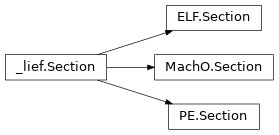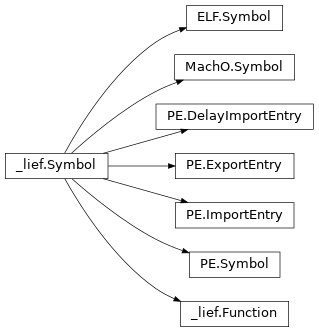Abstract¶
Parser¶
- lief.parse(*args) lief.Binary | None¶
- lief.parse(filepath: str) lief._lief.Binary | None
- lief.parse(obj: io.IOBase | os.PathLike) lief._lief.Binary | None
- lief.parse(filepath: str) lief._lief.Binary | None
Overloaded function.
parse(raw: bytes) -> Optional[lief._lief.Binary]Parse a binary supported by LIEF from the given bytes and return either:
depending on the given binary format.
parse(filepath: str) -> Optional[lief._lief.Binary]Parse a binary from the given file path and return either:
depending on the given binary format.
parse(obj: Union[io.IOBase | os.PathLike]) -> Optional[lief._lief.Binary]Parse a binary supported by LIEF from the given Python object and return either:
depending on the given binary format.
Binary¶

- class lief.Binary¶
Bases:
ObjectFile format abstract representation.
This object represents the abstraction of an executable file format. It enables to access common features (like the
entrypoint) regardless of the concrete format (e.g.lief.ELF.Binary.entrypoint)- class FORMATS¶
Bases:
object- ELF = lief._lief.FORMATS.ELF¶
- MACHO = lief._lief.FORMATS.MACHO¶
- OAT = lief._lief.FORMATS.OAT¶
- PE = lief._lief.FORMATS.PE¶
- UNKNOWN = lief._lief.FORMATS.UNKNOWN¶
- class VA_TYPES¶
Bases:
object- AUTO = lief._lief.VA_TYPES.AUTO¶
- RVA = lief._lief.VA_TYPES.RVA¶
- VA = lief._lief.VA_TYPES.VA¶
- property abstract lief.Binary¶
Return the abstract representation of the current binary (
lief.Binary)
- property concrete lief.ELF.Binary | lief.PE.Binary | lief.MachO.Binary¶
The concrete representation of the binary. Basically, this property cast a
lief.Binaryinto alief.PE.Binary,lief.ELF.Binaryorlief.MachO.Binary.See also:
lief.Binary.abstract
- property ctor_functions list[lief.Function]¶
Constructor functions that are called prior to any other functions
- property debug_info lief.DebugInfo¶
Return debug info if present. It can be either a
lief.dwarf.DebugInfoor alief.pdb.DebugInfoFor ELF and Mach-O binaries, it returns the given DebugInfo object only if the binary embeds the DWARF debug info in the binary itself.
For PE file, this function tries to find the external PDB using the
lief::PE.CodeViewPDB.filenameoutput (if present). One can also uselief.pdb.load()to manually load a PDB.Warning
This function requires LIEF’s extended version otherwise it always return a nullptr
- property entrypoint int¶
Binary’s entrypoint
- property exported_functions list[lief.Function]¶
Return the binary’s exported
Function
- property format lief.Binary.FORMATS¶
File format (
FORMATS) of the underlying binary.
- get_content_from_virtual_address(self, virtual_address: int, size: int, va_type: lief.Binary.VA_TYPES) memoryview¶
Return the content located at the provided virtual address. The virtual address is specified in the first argument and size to read (in bytes) in the second.
If the underlying binary is a PE, one can specify if the virtual address is a
RVAor aVA. By default, it is set toAUTO.
- get_function_address(self, function_name: str) int | lief.lief_errors¶
Return the address of the given function name
- get_symbol(self, symbol_name: str) lief.Symbol¶
Return the
Symbolfrom the givenname.If the symbol can’t be found, it returns None.
- property has_nx bool¶
Check if the binary has
NXprotection (non executable stack)
- property header lief.Header¶
Binary’s abstract header (
Header)
- property imagebase int¶
Default image base (i.e. if the ASLR is not enabled)
- property imported_functions list[lief.Function]¶
Return the binary’s imported
Function(name)
- property is_pie bool¶
Check if the binary is position independent
- class it_relocations¶
Bases:
objectIterator over
lief._lief.Relocation
- class it_sections¶
Bases:
objectIterator over
lief._lief.Section
- class it_symbols¶
Bases:
objectIterator over
lief._lief.Symbol
- property libraries list[str | bytes]¶
Return binary’s imported libraries (name)
- offset_to_virtual_address(self, offset: int, slide: int) int | lief.lief_errors¶
Convert an offset into a virtual address.
- property original_size int¶
Original size of the binary
- patch_address(*args) None¶
Overloaded function.
patch_address(self, address: int, patch_value: list[int], va_type: lief._lief.Binary.VA_TYPES = lief._lief.VA_TYPES.AUTO) -> Nonepatch_address(self, address: int, patch_value: int, size: int = 8, va_type: lief._lief.Binary.VA_TYPES = lief._lief.VA_TYPES.AUTO) -> None
- property relocations lief.Binary.it_relocations¶
Return an iterator over abstract
Relocation
- remove_section(self, name: str, clear: bool) None¶
Remove the section with the given name
- property sections lief.Binary.it_sections¶
Return an iterator over the binary’s abstract sections (
Section)
- property symbols lief.Binary.it_symbols¶
Return an iterator over the binary’s abstract
Symbol
- xref(self, virtual_address: int) list[int]¶
Return all virtual addresses that use the
addressgiven in parameter
Header¶
- class lief.Header(self)¶
Bases:
ObjectClass which represents an abstracted Header
- property architecture lief.ARCHITECTURES¶
Target architecture (
ARCHITECTURES)
- property endianness lief.ENDIANNESS¶
Binary endianness See:
ENDIANNESS
- property entrypoint int¶
Binary entrypoint
- property is_32 bool¶
Trueif the binary targets a32-bitsarchitecture
- property is_64 bool¶
Trueif the binary targets a64-bitsarchitecture
- property modes set[lief.MODES]¶
Target
MODES(32-bits, 64-bits…)
- property object_type lief.OBJECT_TYPES¶
Type of the binary (executable, library…) See:
OBJECT_TYPES
Section¶

- class lief.Section¶
Bases:
ObjectClass which represents an abstracted section
- property content memoryview¶
Section’s content
- property entropy float¶
Section’s entropy
- property fullname bytes¶
Return the fullname of the section including the trailing bytes
- property name str | bytes¶
Section’s name
- property offset int¶
Section’s file offset
- search(*args) int | None¶
Overloaded function.
search(self, number: int, pos: int = 0, size: int = 0) -> Optional[int]
Look for integer within the current section
search(self, str: str, pos: int = 0) -> Optional[int]
Look for string within the current section
search(self, bytes: bytes, pos: int = 0) -> Optional[int]
Look for the given bytes within the current section
- search_all(*args) list[int]¶
Overloaded function.
search_all(self, number: int, size: int = 0) -> list[int]
Look for all integers within the current section
search_all(self, str: str) -> list[int]
Look for all strings within the current section
- property size int¶
Section’s size
- property virtual_address int¶
Section’s virtual address
Symbol¶

Relocation¶

Function¶
- class lief.Function(self)¶
- class lief.Function(self, arg: str, /)
- class lief.Function(self, arg: int, /)
- class lief.Function(self, arg0: str, arg1: int, /)
- class lief.Function(self, arg: str, /)
Bases:
SymbolClass which represents a Function in an executable file format.
- class FLAGS¶
Bases:
object- CONSTRUCTOR = lief._lief.FLAGS.CONSTRUCTOR¶
- DEBUG_INFO = lief._lief.FLAGS.DEBUG_INFO¶
- DESTRUCTOR = lief._lief.FLAGS.DESTRUCTOR¶
- EXPORTED = lief._lief.FLAGS.EXPORTED¶
- IMPORTED = lief._lief.FLAGS.IMPORTED¶
- add(self, flag: lief.Function.FLAGS) lief.Function¶
Add the given
FLAGS
- property address int¶
Function’s address
- property flags list[lief.Function.FLAGS]¶
Function flags as a list of
FLAGS
Enums¶
Object types¶
- class lief.OBJECT_TYPES¶
Bases:
object- EXECUTABLE = lief._lief.OBJECT_TYPES.EXECUTABLE¶
- LIBRARY = lief._lief.OBJECT_TYPES.LIBRARY¶
- NONE = lief._lief.OBJECT_TYPES.NONE¶
- OBJECT = lief._lief.OBJECT_TYPES.OBJECT¶
- from_value(arg: int) lief.OBJECT_TYPES = <nanobind.nb_func object>¶
- property value int¶
The underlying integer value
Architectures¶
- class lief.ARCHITECTURES¶
Bases:
object- ARM = lief._lief.ARCHITECTURES.ARM¶
- ARM64 = lief._lief.ARCHITECTURES.ARM64¶
- INTEL = lief._lief.ARCHITECTURES.INTEL¶
- LOONGARCH = lief._lief.ARCHITECTURES.LOONGARCH¶
- MIPS = lief._lief.ARCHITECTURES.MIPS¶
- NONE = lief._lief.ARCHITECTURES.NONE¶
- PPC = lief._lief.ARCHITECTURES.PPC¶
- RISCV = lief._lief.ARCHITECTURES.RISCV¶
- SPARC = lief._lief.ARCHITECTURES.SPARC¶
- SYSZ = lief._lief.ARCHITECTURES.SYSZ¶
- X86 = lief._lief.ARCHITECTURES.X86¶
- XCORE = lief._lief.ARCHITECTURES.XCORE¶
- from_value(arg: int) lief.ARCHITECTURES = <nanobind.nb_func object>¶
- property value int¶
The underlying integer value
Modes¶
- class lief.MODES¶
Bases:
object- ARM = lief._lief.MODES.ARM¶
- M16 = lief._lief.MODES.M16¶
- M32 = lief._lief.MODES.M32¶
- M64 = lief._lief.MODES.M64¶
- MCLASS = lief._lief.MODES.MCLASS¶
- MIPS3 = lief._lief.MODES.MIPS3¶
- MIPS32 = lief._lief.MODES.MIPS32¶
- MIPS32R6 = lief._lief.MODES.MIPS32R6¶
- MIPS64 = lief._lief.MODES.MIPS64¶
- MIPSGP64 = lief._lief.MODES.MIPSGP64¶
- NONE = lief._lief.MODES.NONE¶
- THUMB = lief._lief.MODES.THUMB¶
- UNDEFINED = lief._lief.MODES.UNDEFINED¶
- V7 = lief._lief.MODES.V7¶
- V8 = lief._lief.MODES.V8¶
- V9 = lief._lief.MODES.V9¶
- from_value(arg: int) lief.MODES = <nanobind.nb_func object>¶
- property value int¶
The underlying integer value